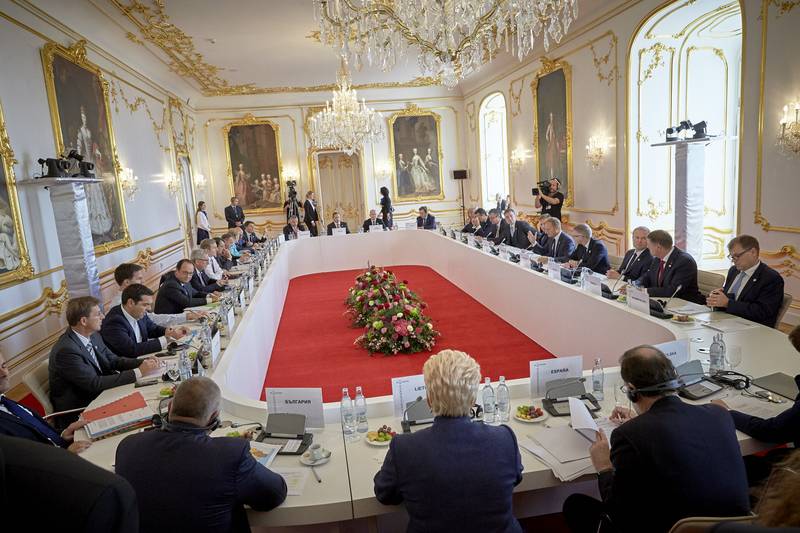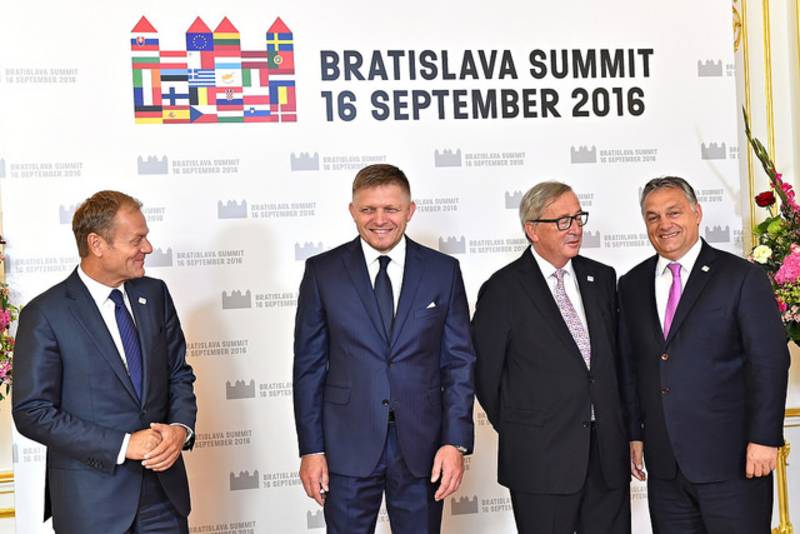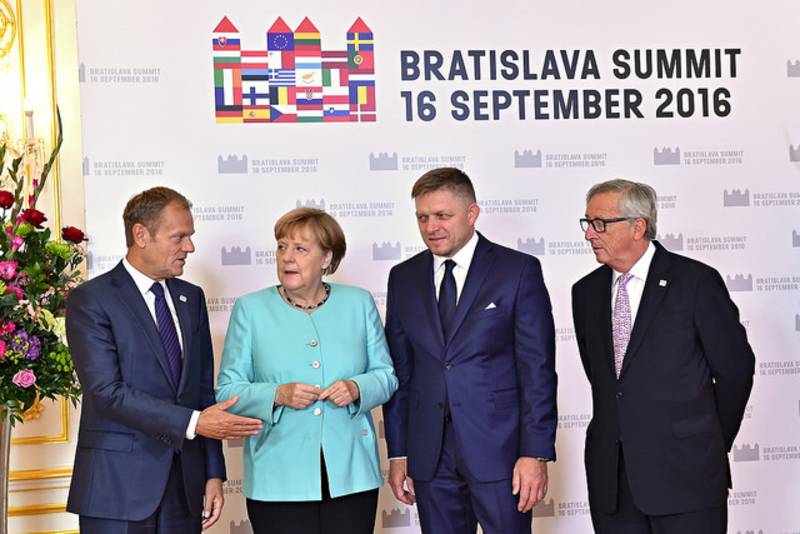Rebellion against the Status Quo in EU*
Adelina Marini, September 19, 2016
 Leaders of EU member states (without Great Britain) gathered in Bratislava for a summit, which brings the charge of setting the beginning of a redefinition of the European Union and its possible rebirth. Less than three months ago the 27 gathered in the margins of the June European Council to decide what to do after Great Britain decided to leave. The signals they sent were that everything was fine, that Brexit was a British problem. Nowadays, however, attitudes are totally different. Ideological division hangs over the EU, which will probably hinder the intention of the organisers of the Bratislava meeting to put a start to the 6-month process of renewal of the Union. Several leaders vowed last week to fight for a new vision for the European Union.
Leaders of EU member states (without Great Britain) gathered in Bratislava for a summit, which brings the charge of setting the beginning of a redefinition of the European Union and its possible rebirth. Less than three months ago the 27 gathered in the margins of the June European Council to decide what to do after Great Britain decided to leave. The signals they sent were that everything was fine, that Brexit was a British problem. Nowadays, however, attitudes are totally different. Ideological division hangs over the EU, which will probably hinder the intention of the organisers of the Bratislava meeting to put a start to the 6-month process of renewal of the Union. Several leaders vowed last week to fight for a new vision for the European Union.
European Council President Donald Tusk (Poland EPP) set the tone of the summit to “now or never” and demanded a very candid conversation on the true state of the Union. It became clear by his words that he is already sick and tired of what the EU currently is. “For sure we haven't come to Bratislava to comfort each other or even less to deny the real challenges that we face”, he said and added: “One thing must be absolutely clear here in Bratislava is that we can't start our discussion here tomorrow with this kind of blissful conviction that nothing is wrong and that everything was and is OK.” Donald Tusk believes that the straw that broke the camel’s back is the Brexit.
The host – Slovakia PM Robert Fico – used similar rhetoric. “After Brexit it is absolutely necessary to meet and be very honest”. He expressed hope that the 27 leaders will hold a very honest discussion on the real current state of the EU. Greek Prime Minister Alexis Tsipras requested a “new common base”. “What Europe needs now is a new vision and concrete agenda for change”, he said. From the statements and proposals made so far it becomes clear that everyone has their own estimate of the state of the Union and a different vision for the future. If it fails to propose a solution for the future, the Bratislava summit will mark the end of the Union the way it used to be so far. What will it become, however, is the big question, the answer to which will hardly fit in the 6-month horizon, placed by the organisers.
The state of the EU according to Donald Tusk
On the eve of the annual address of the European Commission president on the state of the Union, former Polish PM Donald Tusk, who harbours the hope that he will be nominated again to the post by the conservative government in his homeland Poland, published his invitation to the 27 Prime Ministers and Presidents. The text is not traditional – instead of the usual listing of items on the agenda and the order in which they will be placed on the table, Donald Tusk places his own diagnosis to the Union and sends several messages, some of which contradictory. According to him, the EU currently needs reaffirmation of the feeling of a community before the marking of the 60-th anniversary of the signing of the Treaty of Rome, which marks the beginning of the EU.

"It would be a fatal error to assume that the negative result in the UK referendum represents a specifically British issue; that British Euroscepticism is a symptom of political aberration or merely a cynical game of populists exploiting social frustrations", writes Tusk in his letter. According to him, many people in Europe today believe that the EU is an obstacle to stability and security. This is why the correct balance must be found between freedom and security, between the need to be open and protection. In his letter, Donald Tusk sends sharp criticism towards political correctness and states that the tipping point came with the migrant crisis. Instead of people seeing specific actions for establishing control over the situation, “all too often they heard politically correct statements that Europe cannot become a fortress, that it must remain open”, says in the letter, with which Donald Tusk got even closer to the rhetoric and visions of Hungarian PM Viktor Orbán and obviously threw a gauntlet to German Chancellor Angela Merkel.
Tusk urged leaders to draw a roadmap in Bratislava, stating on one hand that the EU needs more European solutions, but at the same time warns that the release of new powers to European institutions is not the needed recipe. He sees the solution in the form of “real optimism”. “We need to do everything not to let it degenerate into a blame game, so futile and so typical of recent years, or a bidding competition for best-sounding slogans, such as "better Europe", "less Europe" or "more Europe". After all, someone might eventually cut it short with "no more Europe"”, ends Donald Tusk’s letter.
The vision of Viktor Orbán
The Hungarian Prime Minister came to the Slovak capital with the mission of bringing the EU a few steps back to “Europe of nations”. It is not quite clear whether the choice of words is a coincidental match to the name of Marine Le Pen’s parliamentary group “Europe of nations and freedom”, but according to the head of the office of the Hungarian PM, János Lázár, the Hungarian PM has received support from all the rest in the Visegrad Four to demand that the European Commission is stripped of the extra powers and that it “should return to its original executive function”. “The European Commission cannot pursue an independent policy of its own that is contrary to the interests of the Member States”, added Mr Lázár at the press conference on the eve of the summit.
During his traditional address to the Hungarian minority in Romania, Viktor Orbán also announced the opening of war against political correctness. “The moment we describe our problems and troubles using a straightforward style of speech we must expect to be branded: we must count on being downgraded, excluded, and in general exiled from the European mainstream. But in fact for fifty to sixty years Europe’s leaders – whether on the left or on the right – have always come from the same circle, the same elite, the same mentality, the same schools, the same institutions raising generations of young politicians.” According to him, Europe is suffering from an elite crisis. At the same time, he advocates for the reinstatement of national sovereignty and loosening of European institutions.
The vision of Alexander Stubb – liberal democracy is in danger
Former Prime Minister of Finland Alexander Stubb sent an appeal to leaders in an article for The Financial Times to come up with three fundamental messages. According to him, the summit should be the first step “on a long road to renewal”. The first message is not to rush with Brexit. Great Britain needs to be left alone to decide what relations it wants with the EU, and, at the same time, the Union needs to try and understand what life would be without Great Britain. The second message is that the community should concentrate on the main things like economic growth, creating jobs, and security. “If the EU proves unable to deal with the migration  crisis, the economy or terrorism, then other options will emerge. And unfortunately those options have more to do with the rejection of liberal democracy”.
crisis, the economy or terrorism, then other options will emerge. And unfortunately those options have more to do with the rejection of liberal democracy”.
The third message is standing firm behind European values. “Today's defenders of liberal democracy, market economies and globalisation are few and far between. Some of the language used in the west, even among EU leaders, makes the traditional despot look like a supporter of democracy and peaceful coexistence. Many east and central European leaders were considered heroes in the fight against communism. Yet some are turning their backs on the very principles they fought for. This must change if Europe is to survive”.
The appeal at the end of Alexander Stubb’s text is with a wink to the USA presidential candidate Donald Trump, but actually reveals the former Finnish PM’s greatest concern: “So to all the leaders meeting in Bratislava, please think about what we have achieved in the past 25 years. Cherish it, defend it and, above all, improve it. It is time we made Europe great again”, is Mr Stubb’s message.
euinside’s summary – the EU is ideologically divided
People in some parts of Eastern Europe have finally joined the EU – they understood that membership is not just inflows of European funds and looking for a better paid job elsewhere, but also brings the risk that your partners will ask you to share their burden – whether it would be by aiding a struggling euro area country, or by accepting a certain number of refugees. This part of Europe does not like such a Union. It says that it is not responsible for the bad state of Greek finances, nor is it for conflicts in the world, which generate refugees (regardless of the recent discovery that some of them have exported firearms for such conflicts). In other words, they are saying that whoever made whatever mess is the one that needs to clean it up. This part of the Union feels rebellious against the mentality of the older part, against its education, and against it being the leader so far. It believes it is its turn now to lead Europe.
Such logic shows that the EU is divided ideologically. On one side are those countries, which accept European integration as a historic process, which needs to continue. To them, this process needs fine-tuning to make it more effective. Among them are the founding countries, to which the EU is a rectification of previous mistakes and a guarantee that they will not be repeated. Among them are also several of the new members, to which European integration is their own choice and is a guarantee for their breaking away from the time when they were on someone’s napkin. On the other side are the “innocent” ones, who have emancipated from the romanticism of enlargement and have taken the illiberal road. Their aim is to disintegrate the European Union down to the level which suits them in domestic political plan and will further their ambitions.

The summit in Bratislava will perhaps give the opportunity to leaders to say some truths directly in the eye. Many will probably tell Angela Merkel that she has made a mistake by opening Germany’s doors to refugees in order to relieve Hungary. Perhaps others will lose their nerve, likethe foreign minister of Luxembourg Jean Asselborn did when he recently appealed that Hungary be kicked out of the EU because of PM Viktor Orbán’s illiberal views. Third will attempt to push through their own interests like Italian Prime Minister Matteo Renzi who wants that the EU does not interfere with his accounts (budget deficit and public debt) and leave him alone to do his reforms. Yet fourth will take advantage of the situation to squeeze more money out, like Bulgarian Prime Minister Boyko Borissov, who days before Bratislava met in Bulgaria with Hungarian PM Viktor Orbán and made a disturbing statement:
"Only this year two large payments came due – 1.2 billion for the American power stations and now in these next days we will decide on 1.3 billion for the Russian power stations. Well, there is no budget that could withstand this amount of money at this time and so we insist in Bratislava that 160 million euro be voted for Bulgaria and immediately at that, now, not in the next period, because my colleagues see what the state of the equipment is, it is under pressure 24 hours a day. Only 20 percent of equipment is currently on the field, the rest is in for repairs".
Perhaps Bratislava will put an end to the politics of compromise, and it could also lead to a new compromise, which would release some steam and postpone unpopular decisions for later. In all cases, the summit will put an end to the European Union the way it has been so far – a group of states, which are moving, perhaps not always with the same speed, but at least in the same direction. It will show the clash between European liberalism and Eastern-European illiberalism. Whether this will lead to a new union or it will lead to disintegration is yet to be seen.
Translated by Stanimir Stoev
*The text was published ahead of the Bratislava summit
 Federica Mogherini | © Council of the EU
Federica Mogherini | © Council of the EU | © Council of the EU
| © Council of the EU Luis De Guindos | © Council of the EU
Luis De Guindos | © Council of the EU